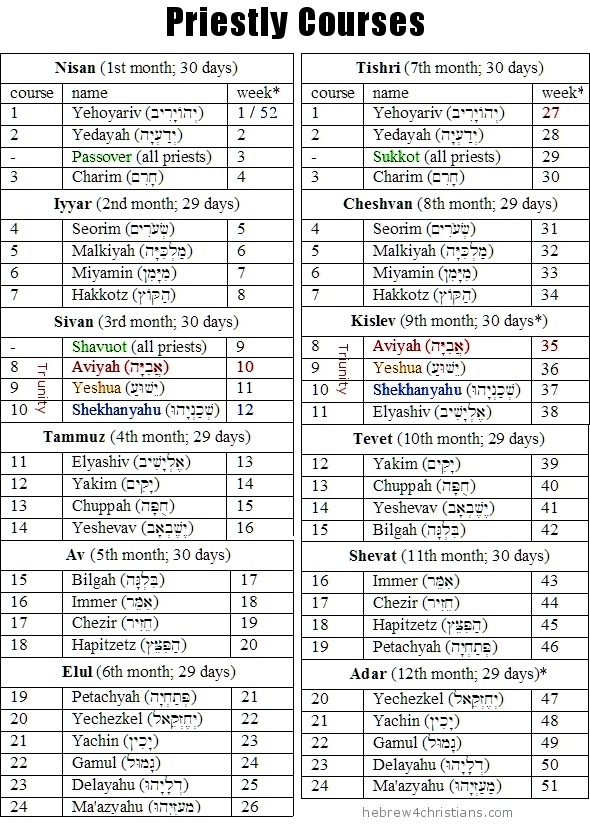|
Was Jesus (Yeshua) really born on December 25th, as the Western Christian Tradition maintains, or does the careful study of Scripture allow us to infer a different time for His advent here on earth? Two cases can be reasonably made: one case for a Tishri (Sukkot) birth, and the other for the traditional late December date. As I hope you will see, the crux of the arguments both for and against the late December dating of the birth of Yeshua depend upon when we think Zechariah (John the Baptist's father) was in the Temple when he was visited by the angel Gabriel...
The Scriptures teach that King David divided the sons of Aaron (i.e., the priests) into 24 "courses" or groups to create an orderly schedule by which the Temple of the LORD could be staffed for the year (1 Chr. 24:1-4). Once these courses were established, lots were drawn to determine the sequence each group would serve in the Temple (1 Chr. 24:7-19) beginning with the first course in the Spring on Nisan 1 (Rosh Chodashim). Each of the 24 courses of priests would begin and end their service on the Sabbath day for a tour of duty of one week (2 Chr. 23:8, 1 Chr. 9:25).
Now recall that Jewish calendar begins in the spring (i.e., Nisan 1), so the first course of priests would serve for seven days and the following week the second course would serve. The third week would mark the festival of Passover when all priests would be present for service, so the schedule would be suspended until the following week when the third course of priests would serve. The weekly arrangement would then resume until the holiday of Shavuot (Pentecost) when the schedule was suspended again for the ninth week. By the tenth week the eighth course (of Aviyah) would be called for Temple service and the courses would continue without further interruption until the 24th course was completed (see table below). Note that after the 24th course served, the first half of the calendar would be complete and the schedule would then reset for the second half of the year. By means of this arrangement each group of priests would serve in the Temple twice per year (in addition to the three major festivals of Passover, Shavuot, and Sukkot).
 |
Note that this weekly schedule of the Temple service allows us to infer the birth date of both John the Baptist and Yeshua the Messiah. Of particular interest is the eighth course of the priests, called the "Course of Aviyah" (mentioned in 1 Chr. 24:10) which was the course that Zechariah served (Luke 1:5). Now since the eighth course would serve either during the month of Sivan or later during the month of Kislev (see see table above), we have two possibilities regarding establishing the birth date of Yeshua the Messiah. If the visitation of Gabriel occurred during Zechariah's first course of service (i.e., the 10th week), then John would have been conceived sometime during the month of Sivan (Luke 1:23-4), and adding 40 weeks to this (the normal time of human gestation) John would have been born sometime in the month of Nisan, perhaps around the time of Passover. Furthermore, since Yeshua was conceived six months after John was conceived (Luke 1:24-27, 36), adding six months (or 24 weeks) to the end of Sivan implies his conception would have occurred in mid to late Kislev (near the time of Chanukah). Adding 40 weeks to this (again, the approximate time of human gestation), Yeshua then would have been born sometime in the month of Tishri, during the season of Sukkot (i.e., "Tabernacles"). On the other hand, if the visitation by Gabriel occurred during Zechariah's second service (i.e., 35th week), then John would have been conceived after Yom Kippur (Luke 1:8-23) and born 40 weeks later in month of Tammuz. Again, since Yeshua was conceived six months after John was conceived (Luke 1:24-27, 36), adding six months (or 24 weeks) would imply he was conceived during Passover and born later during the month of Tevet, near the traditional late December birth...
For more on this topic see "Christmas Day: Was Jesus Really Born on December 25th?" or download the printable version here:
Note: The fact that different church groups have chosen one date over another to memorialize certain historical events (such as the birth date of the Messiah) is simply something we must tolerate, especially because the Scriptures do not provide enough information to conclusively determine the matter, and we are instructed to follow after peace (Heb. 12:14)... This is not a question regarding the historicity of the person of Yeshua, since that is not seriously questioned by historical scholars. However, the Scriptures do accommodate divergent convictions on such matters, as Paul gave the principle: ß┐Ø╬¤Žé ╬╝ßĮ▓╬Į ╬║ŽüßĮĘ╬Į╬Ą╬╣ ß╝Ī╬╝ßĮ│Žü╬▒╬Į ŽĆ╬▒ŽüߊĮ ß╝Ī╬╝ßĮ│Žü╬▒╬Į, ßĮāŽé ╬┤ßĮ▓ ╬║ŽüßĮĘ╬Į╬Ą╬╣ ŽĆߊȎā╬▒╬Į ß╝Ī╬╝ßĮ│Žü╬▒╬Į. ß┐×╬Ģ╬║╬▒ŽāŽä╬┐Žé ß╝É╬Į Žäß┐Ę ß╝░╬┤ßĮĘß┐│ ╬Į╬┐ß┐Æ ŽĆ╬╗╬ĘŽü╬┐Žå╬┐Žü╬ĄßĮĘŽā╬ĖŽē - "One person esteems one day as better than another, while another esteems all days alike. Each one should be fully convinced in his own mind" (Rom: 14:5). "So then let us pursue what makes for peace and for mutual upbuilding" (Rom. 14:19).
You might not agree with my tentative conclusions here, but if you want to make a case for a different date, please do your own research on the question. Read the relevant Hebrew texts, do the math, consult the Jewish calendar, read the New Testament, check the Greek, and determine whether you think Zechariah was serving at the Temple during the month of Sivan or later, during Tishri, perhaps during the time of Yom Kippur. Shalom!
Hebrew Lesson
Psalm 34:14 reading (click for audio):
|




